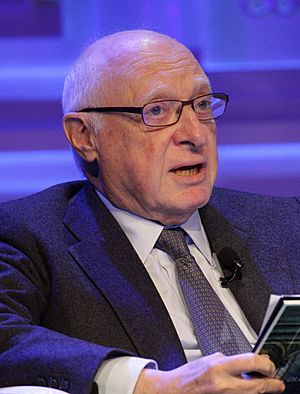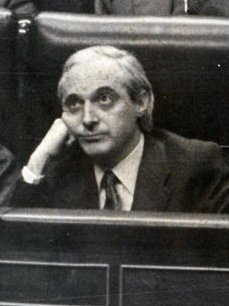José Pedro Pérez-Llorca facts for kids
Quick facts for kids
José Pedro Pérez-Llorca
|
|
|---|---|
 |
|
| Minister of Foreign Affairs | |
| In office 9 September 1980 – 1 December 1982 |
|
| Prime Minister | |
| Preceded by | Marcelino Oreja |
| Succeeded by | Fernando Morán López |
| Minister for Territorial Administrations | |
| In office 3 May 1980 – 9 September 1980 |
|
| Prime Minister | Adolfo Suárez |
| Preceded by | Antonio Fontán |
| Succeeded by | Rodolfo Martín Villa |
| Minister of the Presidency | |
| In office 6 April 1979 – 3 May 1980 |
|
| Prime Minister | Adolfo Suárez |
| Preceded by | José Manuel Otero |
| Succeeded by | Rafael Arias-Salgado |
| Member of the Congress of Deputies | |
| In office 29 June 1977 – 31 August 1982 |
|
| Personal details | |
| Born |
José Pedro Pérez-Llorca Rodrigo
30 November 1940 Cádiz, Spain |
| Died | 6 March 2019 (aged 78) Madrid, Spain |
| Political party | Union of the Democratic Centre |
| Alma mater | Universidad Complutense |
José Pedro Pérez-Llorca (born 30 November 1940 – died 6 March 2019) was an important Spanish lawyer and politician. He served as the Minister of Foreign Affairs for Spain from 1980 to 1982.
During his time as minister, Spain joined NATO, a military alliance. He also played a big part in Spain getting closer to joining the European Union. Pérez-Llorca was known as one of the "Fathers of the Constitution" because he helped create Spain's 1978 Constitution. This was a key step in Spain's move towards democracy after a long period of dictatorship.
Contents
Early Life and Education
José Pedro Pérez-Llorca was born in Cádiz, Spain, on 30 November 1940. He studied law at the Universidad Complutense in Madrid. He earned his law degree from this university.
Political Career and Achievements
Pérez-Llorca started his career as a lawyer. He also taught constitutional law at his old university, Universidad Complutense.
Helping Create Spain's Constitution
One of his most important roles was helping to write the 1978 Spanish Constitution. He was part of a special group of seven people called la Ponencia. This group was in charge of writing the first draft of the new constitution. This document was very important for Spain's future as a democratic country.
Serving in Government
Pérez-Llorca became a member of a political party called the Union of the Democratic Centre. He was elected to the Congress of Deputies, which is like Spain's parliament, from 1977 to 1982. He represented the area of Madrid.
In 1979, he became a minister in the government led by Prime Minister Adolfo Suárez. He first served as the Minister for the Presidency. Then, he became the Minister of Territorial Administration.
Minister of Foreign Affairs
In September 1980, Pérez-Llorca was chosen to be the Minister of Foreign Affairs. He took over this role from Marcelino Oreja. He continued in this position when Leopoldo Calvo-Sotelo became Prime Minister.
During his time as Foreign Minister, Spain's relationships with other countries became much stronger, especially with Western nations. He focused on improving Spain's ties with European countries.
Joining European Communities and NATO
A big moment during his time was on 17 November 1982. The European Parliament officially approved Spain joining the European Communities. This was a group of European countries that later became the European Union.
Another major event was Spain becoming a member of NATO in May 1982. NATO is a military alliance between many countries in North America and Europe. His term as Minister of Foreign Affairs ended in December 1982.
Later Career and Activities
After his time in government, Pérez-Llorca held several important positions in different companies. In 1983, he helped start the Pérez-Llorca law firm. He was the chairman of this firm for many years. He also served on the boards of other companies, like Telefónica.
He was also involved with non-profit organizations. He was a board member for the International Airlines Group. He also had a role at the FAES Foundation and the Museo Nacional del Prado, a famous art museum in Madrid.
Death
José Pedro Pérez-Llorca passed away on 6 March 2019. His funeral was held in Madrid. Many important people attended, including King Felipe and Queen Letizia of Spain.
See also
 In Spanish: José Pedro Pérez-Llorca para niños
In Spanish: José Pedro Pérez-Llorca para niños


